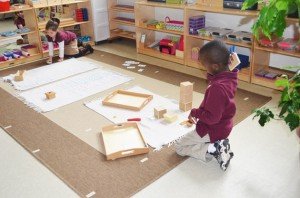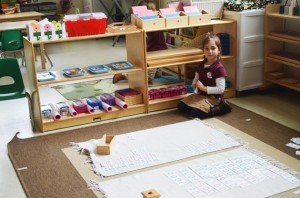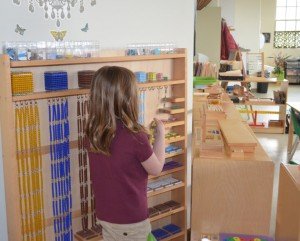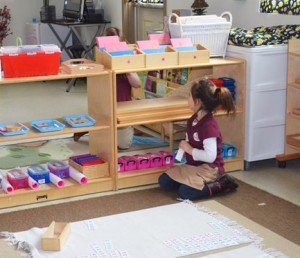
“A lot of really creative thinkers you’ll find have had a Montessori education as a young child,” explained Rebecca Maguire, Director of Admissions for Bristow Montessori School. She said the Montessori method helps promote “that ability to really think outside the box.”
Many people recognize a Montessori education does things differently than most public schools and even private schools, but they may not realize Montessori educators do things practically as well. While public schools in Prince William have the largest class sizes in the state, elementary classes at Bristow Montessori have no more than 18 students per class.
Bristow Montessori, located on Devlin Road in Bristow, offers classes for infants, toddlers, preschoolers and kindergarteners. They also offer an an elementary class that incorporates first through third grade. Maguire said the system of having different ages in a classroom has proven beneficial to students, so it has become standard practice in Montessori schools.
“ a benefit of this mixed age group in a classrooms. It was probably something that people did a long time ago out of necessity, but with a teacher’s supervision, it works well for this particular age group because they’re wired to open up to the community,” Maguire said.
Furthermore, the Montessori classroom was never organized after the assembly line model of 20th century, so students have always been treated as individuals in student-centric classrooms.
Public and private schools have started to incorporate many proven Montessori methods, making classrooms more student centered and moving them towards authentic assessments, but Lola Pavlovic, Director of Operations at Bristow Montessori School, says a cherry-pick method can possibly do more harm than good. Pavlovic said she doubts that “picking and choosing some things from different methods” works well.

“What you’re losing is control over is how those little pictures will affect the bigger picture,” she said.
Pavlovic believes students do not get the same quality of education when schools experiment with various educational methods without a solid foundation of beliefs to guide that approach.
Pavlovic and Maguire say another advantage of a Montessori education is that it emphasizes skill and knowledge acquisition assessing the child without traditional testing methods.
“One of the biggest pieces that will set this type of school apart is we don’t have tests. We don’t have homework,” Pavlovic said. “The learning that goes on during a course of a normal school day is more than sufficient. A teacher is constantly observing and evaluating the students.”
Parents also get more in depth reports on their children’s progress, because the report card is more of a narrative.
Public schools are starting to realize that school should be more focused on skill and knowledge development than on assessments, but they are fighting against their own history and culture. Simultaneously, they are butting up against a time of extreme government intervention into public education. Federal Policies such as No Child Left Behind, the Common Core, and state-wide initiatives such as the SOLs (Standards of Learning) require schools to provide accountability in the form of high-stakes testing.

But testing was never inherent in the Montessori way of learning. Instead, they impart a triangle system, which mirrors the more natural progression of how people learn on their own or with the aid of a mentor. A child progresses from being introduced to a new skill, practicing the skill and then mastering the skill.
“It marks the benchmark for a child itself,” said Pavlovic. “A child will not compare him or herself against anyone else.”
By this measure, no one is a “failure” or “average” or “superior” to anyone else. Children progress at their own rate. And, because the class includes students of different ages and development levels, students do not feel they need to be exactly on par with everyone else.
And because the model is based on intrinsic motivation, the children do not need A’s, S’s, stickers or stars to recognize they are achieving.
Another difference between Montessori and traditional methods is that Montessori utilizes more learning materials than it does textbooks or computer programs. Children learn through exploring their world, and toys aid in this process, so Montessori materials help children learn through play.
For instance, the math program includes small items to be added, multiplied, subtracted, divided, even squared. To square or cube a number seems like an abstract concept, but when students physically build squares and cubes, using blocks or beads, it is no longer abstract.
Montessori educators like Pavlovic believe it's easier for children to learn using these materials than it is for them to read the concept in a book, which is one step removed from real world learning.

Maguire said many of Bristow Montessori families have chosen a Montessori education for their children because of the small class sizes, the individual attention and the unique real world approach to learning. Many of these parents, she said, have always known they wanted a private school environment for their children. However, Maguire also wants to invite parents who perhaps have not considered a Montessori education or even a private school education to visit Bristow Montessori and learn more about what the school has to offer.
Those interested in learning more about Bristow Montessori’s first through third grade elementary, preschool, kindergarten, toddler, or infant programs can visit BristowMontessori.com, or call 703-468-1191 to set up an appointment to visit the school.
Bristow Montessori is also holding an open house Sunday, March 30 from 10 a.m. to 1 p.m.
Support Bristow Beat - Donate Today!